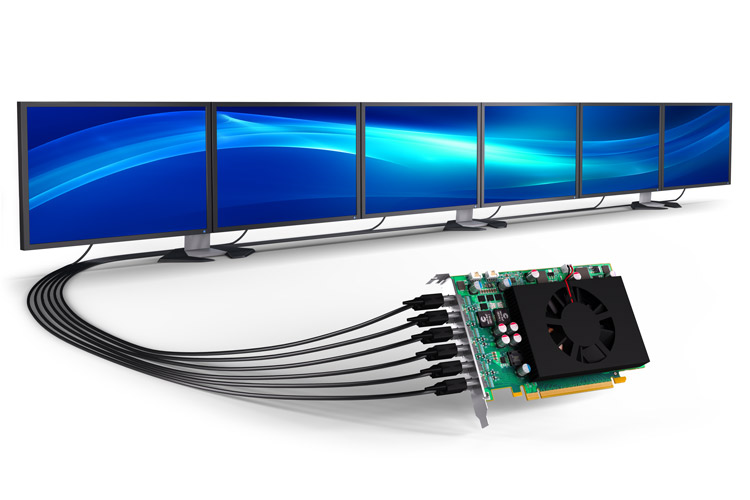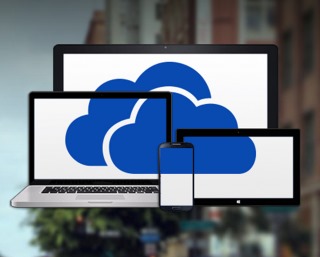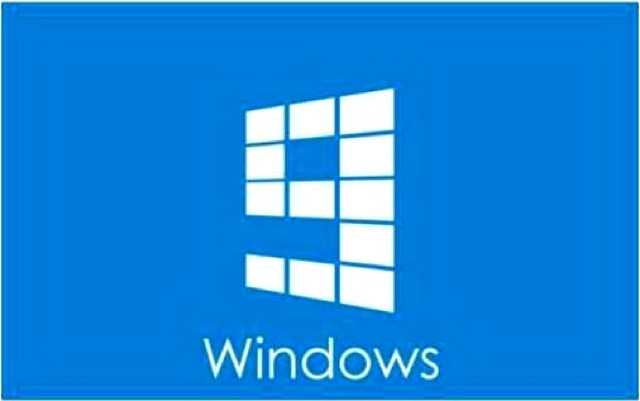
Matrox announces the C-Series -- quad and six-head graphics cards for Windows and Linux
When enthusiasts hear the term "graphics card", images of gaming cards are conjured. However, gaming cards and graphics cards are not synonymous. No, believe it or not, people use computers for things other than Wolfenstein and Crysis. Actually, there are many uses, such as powering multiple monitors for things like advertising, security monitoring and media events. Hell, a business may utilize a multi-monitor setup for a litany of reasons.
Today, long-time hardware manufacture, Matrox, announces a pair of sexy graphics cards aimed at the business world. Dubbed the "C-Series", they are based on AMD GPUs and can power either 4 or 6 monitors. Whoa.

OneDrive file size limits jumps to 10GB, while syncing, sharing and uploading improve
A couple of weeks ago it looked as though Microsoft was lifting the 2GB file size limit for OneDrive users. Although no announcement was made, some users of the cloud storage service found that they were able to sync files larger than 2GB. Now, the increase in supported file size is official. OneDrive users can now upload files up to 10GB in size, bringing Microsoft's service in line with Dropbox and Google Drive. This is the latest example of Microsoft responding directly to user feedback, specifically a UserVoice thread in which users called for the 2GB file size limit to be banished.
Today Jason Moore, Group Program Manager of OneDrive, responded to the demands with a simple message: "We're proud to announce OneDrive now supports up to 10 GB files". While this is not quite the unlimited file size some people were looking for, it is a big improvement and something that will be widely welcomed. Considering the free version of OneDrive offers 15GB of storage, it is now possible to fill up your account with just two files. If you're an Office 365 customer with access to 1TB of space, you'll need to upload at least 100 files.

Major malvertising network targets Windows and Mac users
A new malicious advertising network is affecting sites including Amazon, Yahoo and YouTube. Dubbed "Kyle and Stan" by the Cisco Talos Security Research group that uncovered it, the malware is able to mutate to attack both Windows and Mac systems.
Online advertising has relatively few major distribution networks, by getting ads onto one of these an attacker has the potential to get malicious content in front of large numbers of users.

VirtualXP Free lets you convert your old Windows XP PC into a virtual machine
Farstone Technology has released VirtualXP Free 1.0, a free-for-personal-use tool that simplifies the task of converting a Windows XP or Windows Server 2003 physical PC into a virtual machine.
The idea is that users hesitating about switching to a newer version of Windows can take their old system with them, ensuring all data, settings and programs continue to work going forward.

Microsoft China reveals Windows 9's logo
Microsoft Windows 9's logo may have been accidentally outed by the company’s Chinese arm just 28 days before the company reportedly plans to officially unwrap the new version of Windows.
A post on the Microsoft China Weibo page, reported by CN Beta, showed a number nine made up of Windows tiles that have become a familiar feature of recent versions of the OS with the word Windows written underneath.

Opera 24 FINAL adds new tab preview, offers Hi-DPI support in Windows
Opera has released Opera 24 FINAL, a major new release of its web browser for Windows and Mac. It comes with three changes of note, two of which are restricted to Windows users only.
The headline new feature, which covers all platforms, sees Opera gain tab preview. By rolling the mouse over any non-active tab, users will -- after a short pause -- see a pop-up thumbnail of that tab's current contents.

China gives Microsoft 20 days to play ball in antitrust probe
China is turning up the heat in its antitrust probe into Microsoft, with the authorities laying down a deadline for Redmond to respond regarding allegations of the software giant unfairly leveraging its products.
The State Administration for Industry and Commerce (SAIC) has laid down a time limit of 20 days for Microsoft to provide a satisfactory response to the antitrust probe which is focusing on Windows and Office (Internet Explorer and Windows Media Player have also been previously picked out as bones of contention, as well).

Instantly generate sketched characters with DrawWiz
DrawWiz is an easy-to-use app, Windows and Mac program which instantly generates professional sketches of female cartoon characters.
There's no artistic ability required, fortunately. The app provides hundreds of pre-drawn elements -- situations, face shapes, hair styles, eyes, nose, mouth -- and all you have to do is pick the ones you need.

Quickly retouch your portraits with Free Photo Blemish Remover
High resolution digital photos are great for most purposes, but can be a little cruel for portrait shots, where every skin imperfection is suddenly blown up in extreme detail.
Some photo editors have "beautifying" modules to help clean such problems, or you can often fix them yourself with a little painting or clone work. Free Photo Blemish Remover is another option, a specialist tool which can remove image imperfections with a click.

Windows 8.x gains usage share at the expense of Windows XP
New data which was just posted by web analytics company NetMarketShare shows us that, in August, Windows 8.x managed to gain precious usage share in the desktop operating system market. This happened mainly at the expense of the 13 year-old Windows XP, which is seeing its usage share slowly decrease as new devices, toting newer OSs, are brought into the fold.
The good news, however, comes from the rise in usage share of Windows 8.1, which is now at 7.09 percent, up from the 6.56 percent from July. Windows 8 also grew, to 6.28 percent from 5.92 percent, but this is of a lesser importance, as its successor's fate is far more important. Meanwhile, Windows XP decreased to 23.89 percent from 24.82 percent. Still, it is obvious that the oldest of the three still has a terribly long way to go before it reaches similar usage share levels (we're looking at a couple of years, at least) as Windows 8.1 touts now.

WinLogOnView lists user logons for your PC
If your PC has several user accounts then you might occasionally like to know when they're being accessed, perhaps to confirm that your children are only using the computer at particular times.
You could install some heavy duty system monitoring package, or maybe enable a few Family Safety restrictions for that account. But NirSoft's WinLogOnView is a much simpler option which could provide everything you need in a tiny, portable package.

Display your external IP address on the desktop with Mr.IP
Discovering your external IP address is generally very easy. Just visit a site like WhatIsMyIP and it'll give you the IP address, location, ISP, and a whole lot more.
If you need speedy access to this address all the time, though, it might be simpler to use Mr.IP, a tiny free tool which permanently displays your internet -- or external -- IP on the desktop.

Easily inspect DXF files with de-caff DXF Viewer
DXF is a very popular CAD file format which has been around since 1982, so you might expect there to be plenty of good viewers around by now.
Unfortunately, the reality is very different. DXF can be complex, and while there are free viewers to be found, they're generally of not much use.

GlassWire is an easy-to-use network monitor
Whether you're concerned about security, or just hoping to optimize your PC’s performance, understanding what's accessing your internet connection can be very helpful.
Network monitors will tell you more, but they're often targeted at experts, weighed down with complex details which -- even if you understand them entirely -- you may not really need. GlassWire is an interesting free network monitor aimed at a more general audience. It’s easy to use, looks great and provides in-depth reports, but they’re easy to follow and focus on only the most important information.

Corel PaintShop Pro X7 adds new Magic Fill erase tool, promises more responsive brush performance
Corel has released PaintShop Pro X7, a major new version of its venerable photo and image editor. Version X7 sees a number of new features, including Magic Fill erase tool. It also sees its popular tools redesigned to make them easier to use.
The app also comes with the promise of more responsive Paint Brush, Airbrush and photo retouching brush tools thanks to a performance gain of up to 30 percent.
